Updated: April 8, 2021 7:33:16 pm
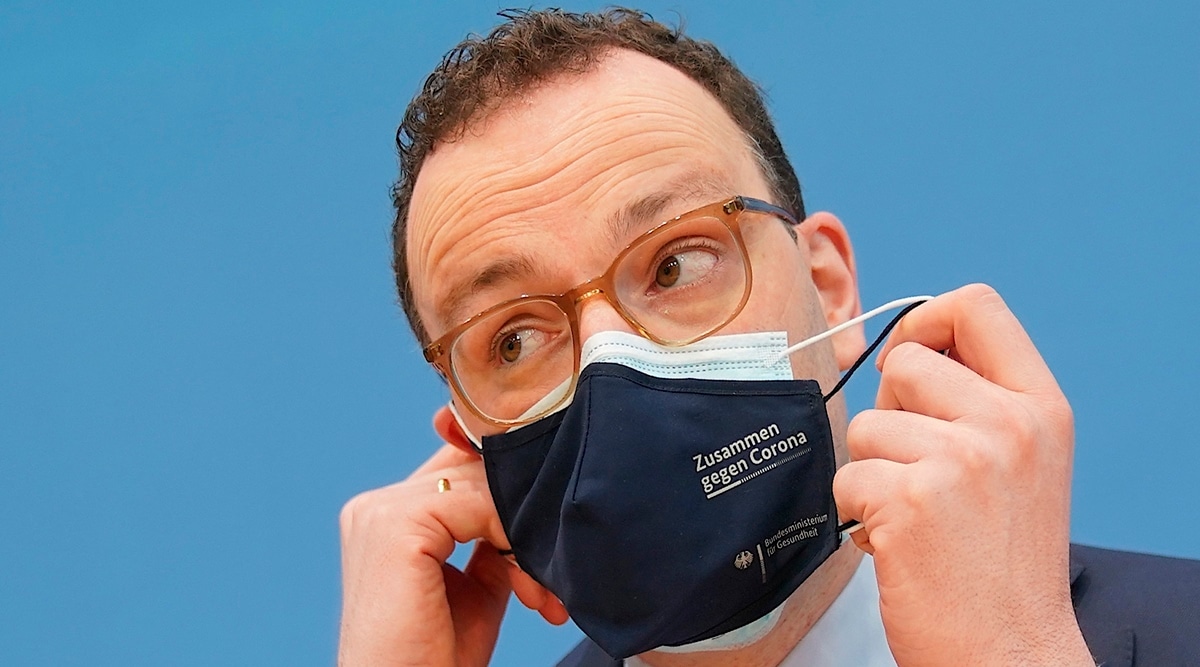 Jens Spahn, Federal Minister of Health, takes off his mouth-nose protection at the Federal Press Conference in Berlin, Germany, Thursday, April 1, 2021. (Michael Kappeler/dpa via AP)
Jens Spahn, Federal Minister of Health, takes off his mouth-nose protection at the Federal Press Conference in Berlin, Germany, Thursday, April 1, 2021. (Michael Kappeler/dpa via AP) Germany’s health minister said the European Union won’t order Russia’s Sputnik V coronavirus vaccine and his country will hold bilateral talks with Russia on whether an order makes sense. Health Minister Jens Spahn told WDR public radio that the EU’s executive Commission said Wednesday it won’t place orders for Sputnik V on member countries’ behalf, as it did with other manufacturers.
Spahn said Thursday he told his fellow EU health ministers that Germany “will talk bilaterally to Russia, first of all about when what quantities could come.” He said “to really make a difference in our current situation, the deliveries would have to come in the next two to four or five months already.”
Otherwise, he said, Germany would have “more than enough vaccine” already. Spahn reiterated that, as far as Germany is concerned, Sputnik V must be cleared for use by the European Medicines Agency, and “for that, Russia must deliver data.”
Germany’s vaccine task force will hold talks with the developers of Russia’s Sputnik V COVID-19 shot, including the possibility of setting up more production sites in Germany, a government source told Reuters on Thursday.
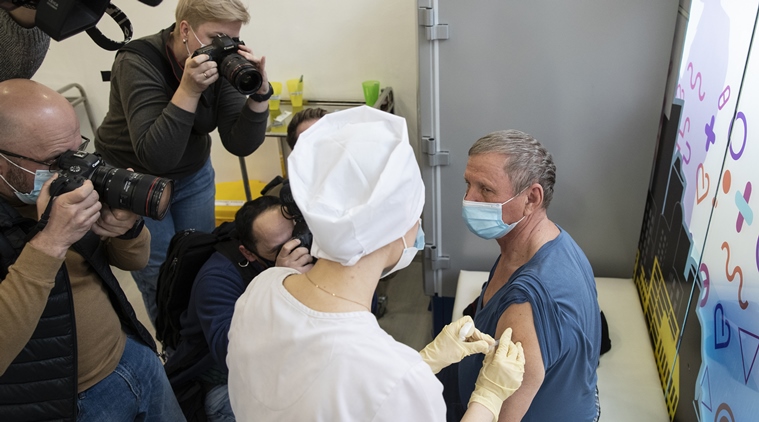 News photographers take pictures as a medical worker administers a shot of Russia’s Sputnik V coronavirus vaccine in Moscow, Russia, Wednesday, April 7, 2021. (AP Photo/Pavel Golovkin)
News photographers take pictures as a medical worker administers a shot of Russia’s Sputnik V coronavirus vaccine in Moscow, Russia, Wednesday, April 7, 2021. (AP Photo/Pavel Golovkin)
Spahn told WDR public radio that the EU’s executive Commission said Wednesday it won’t place orders for Sputnik V on member countries’ behalf, as it did with other manufacturers.
Russian drugmaker R-Pharm has said it will be able to produce Russia’s Sputnik V vaccine at its factory in the southern German state of Bavaria once it has been approved by the European Medicines Agency (EMA). German vaccine producer IDT Biologika is also in talks about possibly producing the vaccine, but no agreement has been reached.
Australia halts AstraZeneca shot for people under 50 years of age
Australia on Thursday become the latest country to restrict use of the AstraZeneca vaccine by recommending that it not be given to people under age 50. The announcement came after drug regulators held a series of urgent meetings earlier in the day that followed advice from the European Medicines Agency that it had found a possible link between the shot and rare blood clots.
Prime Minister Scott Morrison said he had received a series of recommendations from an advisory group on Thursday night, and that chief among them was that the Pfizer vaccine should now be adopted as the preferred vaccine for people aged under 50. Morrison said the recommendations were made with an abundance of caution due to the rare but serious side effects, which have mostly been associated with younger people. “We’ve been taking the necessary precautions based on the best possible medical advice,” Morrison said. “It has not been our practice to jump at shadows.”
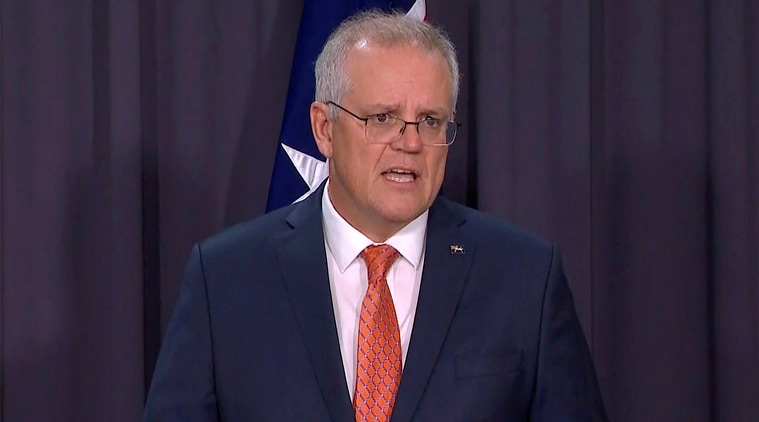 In this image made from video, Australian Prime Minister Scott Morrison speaks during a news conference in Canberra, Australia, Thursday, April 8, 2021. Australia on Thursday become the latest country to restrict use of the AstraZeneca vaccine by recommending that it not be given to people under age 50. (SBS via AP)
In this image made from video, Australian Prime Minister Scott Morrison speaks during a news conference in Canberra, Australia, Thursday, April 8, 2021. Australia on Thursday become the latest country to restrict use of the AstraZeneca vaccine by recommending that it not be given to people under age 50. (SBS via AP)
The Australian Technical Advisory Group on Immunisation also recommended that people under 50 who had already received their first AstraZeneca shot should proceed with getting their second shot, as the medical advice indicated the rare blood clots only develop after the first dose.
Healthcare workers under 50 who were due to receive the AstraZeneca vaccine will now be prioritized for the Pfizer vaccine, which will likely delay the inoculation process.
Philippines temporarily suspends AstraZeneca vaccine under 60
Philippine health officials have decided to temporarily suspend the use of the AstraZeneca Covid-19 vaccine for people below 60 following reports of rare blood clots.
The Department of Health and the Food and Drug Administration said experts were reviewing information related to AstraZeneca’s side effects to come up with a recommendation on the vaccine’s use. “We continue to underscore that the benefits of vaccination continue to outweigh the risks and we urge everyone to get vaccinated when it’s their turn,” FDA Director General Eric Domingo said.
More than 460,000 doses of AstraZeneca have been administered in the country so far and millions of doses more have been ordered by the government and private companies, Philippine officials said.
Over 4 million people to be vaccinated in Hungary by April end
Hungary expects to have more than 4 million of its 10 million people vaccinated against COVID-19 by the end of April and to further ease lockdown measures in five or six days, when it has inoculated 3 million people, a senior official said on Thursday. Prime Minister Viktor Orban’s chief of staff said that 2.6 million people had already received at least one dose as of Thursday. Hungary has inoculated among the most citizens per capita in the European Union and imported the EU’s highest number of vaccine doses per capita.
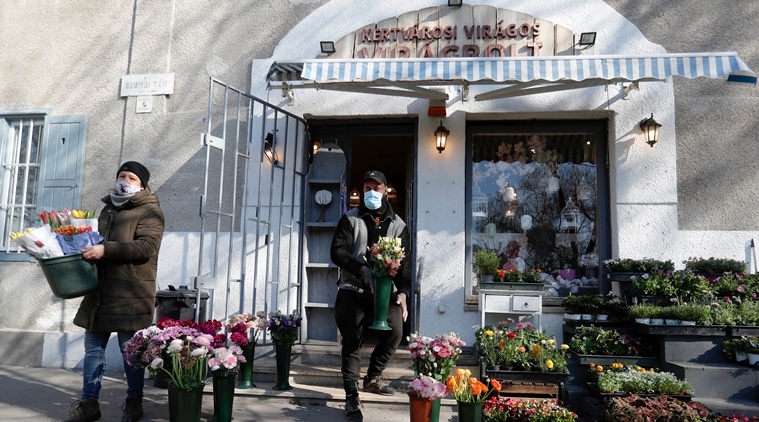 Staff members of a flower shop place flowers on the street in Budapest, Hungary, Wednesday April 7, 2021. Hungary’s government lifted several lockdown restrictions on Wednesday, even as some doctors and medical experts urged caution after a record-breaking day of COVID-19 deaths. (AP Photo/Laszlo Balogh)
Staff members of a flower shop place flowers on the street in Budapest, Hungary, Wednesday April 7, 2021. Hungary’s government lifted several lockdown restrictions on Wednesday, even as some doctors and medical experts urged caution after a record-breaking day of COVID-19 deaths. (AP Photo/Laszlo Balogh)
Hungary began a gradual reopening of shops and services on Wednesday after it inoculated 25 per cent of its population, even as the Hungarian Medical Chamber said the reopening was premature as the third wave of the pandemic was far from over.
“We hope that by the end of May, when we have inoculated everyone… we will have this terrible period behind us,” Orban’s chief of staff, Gergely Gulyas, told a government briefing. Gulyas also said Hungary would continue the rollout of the AstraZeneca COVID-19 vaccine as it considered the vaccine safe.
Spain limits AstraZeneca shot to 60 and above
Spain joined other European nations in limiting the use of the AstraZeneca vaccine to the elderly due to concerns over links to extremely rare blood clotting. Spanish Health Minister Carolina Darias announced on Wednesday after meeting with regional health chiefs that authorities would limit shots to those over 60 years old.
Until now, Spain has used AstraZeneca on its younger population, limiting it those under 65 years old. Darias said that authorities would now consider lifting that upper limit on the shot that forms a key pillar of the nation’s vaccination scheme. “Our strategy with AstraZeneca is pivoting” Darias said.
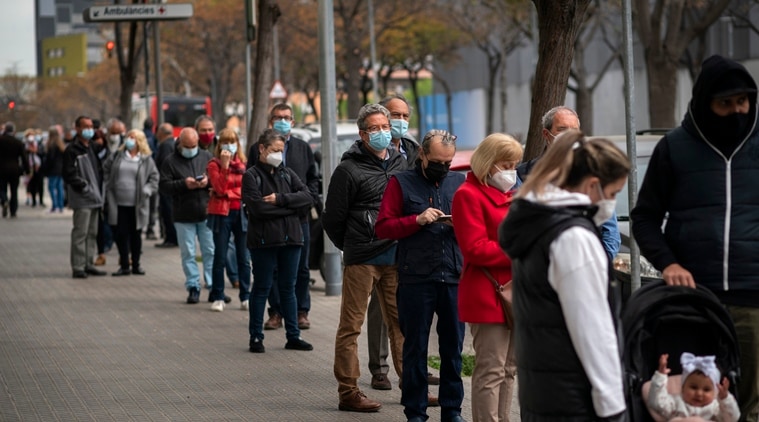 People line up outside a public ambulatory as they wait to receive a dose of the AstraZeneca vaccine in Barcelona, Spain, Tuesday, April 6, 2021. (AP Photo/Emilio Morenatti)
People line up outside a public ambulatory as they wait to receive a dose of the AstraZeneca vaccine in Barcelona, Spain, Tuesday, April 6, 2021. (AP Photo/Emilio Morenatti)
Darias said that her administration would consider what to do with those Spaniard under 60 who have already received the first shot of the two needed for AstraZeneca to be fully effective. As of Wednesday, 2.1 million had received a first shot of the vaccine, while only 97 had gotten the second shot. It was not clear how many of those more than 2 million people waiting for a second shot were under 60.
Over 2 million of the total of 9.3 million doses administered in Spain have been AstraZeneca shots, which are cheaper and more easily stored and transported.
Darias said that “a majority” of regions agreed with the new age limit, but Madrid’s region complained that they did not support the decision.
S Korea to take call on resuming AstraZeneca shots for 60 and below this weekend
Health officials in South Korea say they will decide whether to resume administrating AstraZeneca’s coronavirus vaccines to people 60 and younger over the weekend. The injections were paused while regulators in Europe reviewed a possible link between the shots and rare blood clots.
The Korea Disease Control and Prevention Agency on Thursday noted that the European Medicine Agency emphasized that the benefits of receiving the AstraZeneca vaccine continue to outweigh the risks for most people, even though it said it had found a “possible link” between the shot and the rare clots.
South Korea’s mass immunization campaign has mainly relied on AstraZeneca shots produced locally by BK Bioscience. The country has so far administered first doses to about 1 million people. In the age group of 60 or under, South Korea has only been vaccinating hospital and emergency workers and people in long-term care settings.
The KDCA said it will assess the vaccine’s potential risks and review reported cases of blood clotting with a panel of experts on Thursday.
Daily Covid-19 deaths hit record high in Poland over Easter
Poland’s daily coronavirus-related death report hit a new record of 954 on Thursday though a health ministry spokesman said the figure included deaths from over the Easter weekend and did not represent a 24-hour period.
Health ministry spokesman Wojciech Andrusiewicz said the reported figure included 100 deaths from Good Friday, around 130 from Saturday and 130 from Easter Sunday.
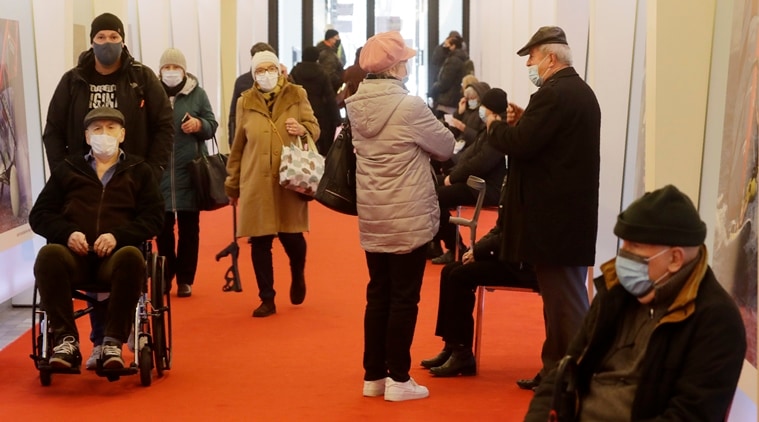 People queuing to report at the desk that they have arrived for their COVID-19 jabs at a temporary vaccination center at the National Stadium in Warsaw, Poland, on Wednesday, April 7, 2021 as the government is stepping up the tempo of nationwide inoculation. (AP Photo/Czarek Sokolowski)
People queuing to report at the desk that they have arrived for their COVID-19 jabs at a temporary vaccination center at the National Stadium in Warsaw, Poland, on Wednesday, April 7, 2021 as the government is stepping up the tempo of nationwide inoculation. (AP Photo/Czarek Sokolowski)
“This is not the result of the last day or the last two days…This report contains quite a lot of victims from the Easter period,” he said. The previous 24-hour record was 674, reported in November.
African Union drops plans to procure vaccine from India’s SII
The African Union has dropped plans to secure COVID-19 vaccines from the Serum Institute of India for African nations and is exploring options with Johnson & Johnson, the head of the Africa Centre’s for Disease Control and Prevention said on Thursday.
The institute will still supply the AstraZeneca vaccine to Africa through the COVAX vaccine-sharing facility, John Nkengasong told reporters, but the African Union would seek additional supplies from Johnson & Johnson. The bloc of 55 member states shifted its efforts to the Johnson & Johnson vaccine, he said, citing the deal signed last week to secure up to 400 million doses beginning in the third quarter of this year.
“…It was just a clear understanding of how not to duplicate efforts with the Serum Institute, so that we compliment each other rather than duplicate efforts,” he said.
Indonesia in talks with China for 100 million vaccine doses after delay in AstraZeneca deliveries
Indonesia is in talks with China on getting as many as 100 million COVID-19 vaccine doses to plug a gap in deliveries after delays in the arrivals of AstraZeneca shots, Health Minister Budi Gunadi Sadikin said on Wednesday. He told a parliamentary hearing that Indonesia would receive 20 million doses of the AstraZeneca vaccine via a bilateral deal in 2021, instead of 50 million doses initially agreed. The remaining 30 million doses were due to be shipped by the second quarter of 2022, he said.
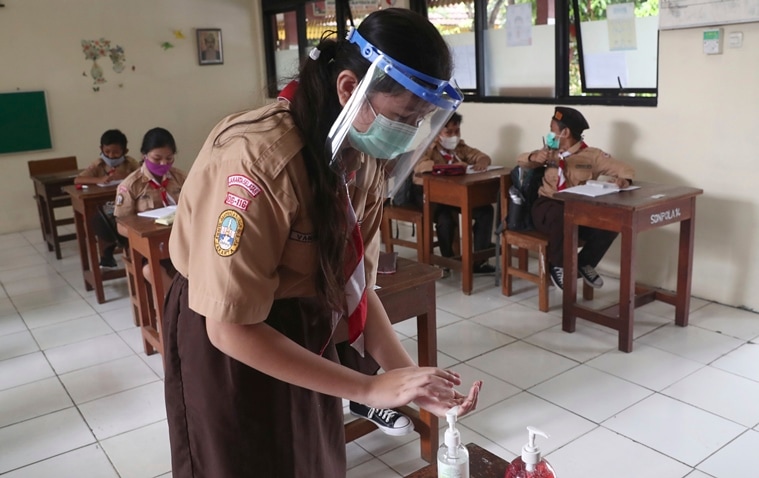 A student wearing a face shield washes her hands with antiseptic during a trial run of a class with COVID-19 protocols at an elementary school in Jakarta, Indonesia, Wednesday, April 7, 2021. (AP Photo/Tatan Syuflana)
A student wearing a face shield washes her hands with antiseptic during a trial run of a class with COVID-19 protocols at an elementary school in Jakarta, Indonesia, Wednesday, April 7, 2021. (AP Photo/Tatan Syuflana)
Budi said the government had “embarked on a discussion with the Chinese government to ask for an additional 90-100 million (doses)”. “We’re also asking for vaccines from the U.S. When they’re done with their own vaccinations and sell their vaccines overseas.”
Besides AstraZeneca, Indonesia relies heavily on vaccines produced by China’s Sinovac Biotech for coronavirus inoculations which began in January. It aims to reach 181.5 million people within a year in a bid to reach herd immunity. Indonesia was also slated to receive 54 million doses of the AstraZeneca vaccine in phases via the COVAX sharing scheme, though Budi said Indian export restrictions would delay shipments in April.
Indonesia has also launched a private vaccination programme to allow companies to buy government-procured vaccines and inoculate staff for free. State-owned company Bio Farma had started negotiations with China’s Sinopharm and Cansino, along with the producer of Russia’s Sputnik V, for vaccines for the private programme, Bio Farma chief executive Honesti Basyir told the parliamentary hearing.
(Inputs from AP, Reuters)
- The Indian Express website has been rated GREEN for its credibility and trustworthiness by Newsguard, a global service that rates news sources for their journalistic standards.

